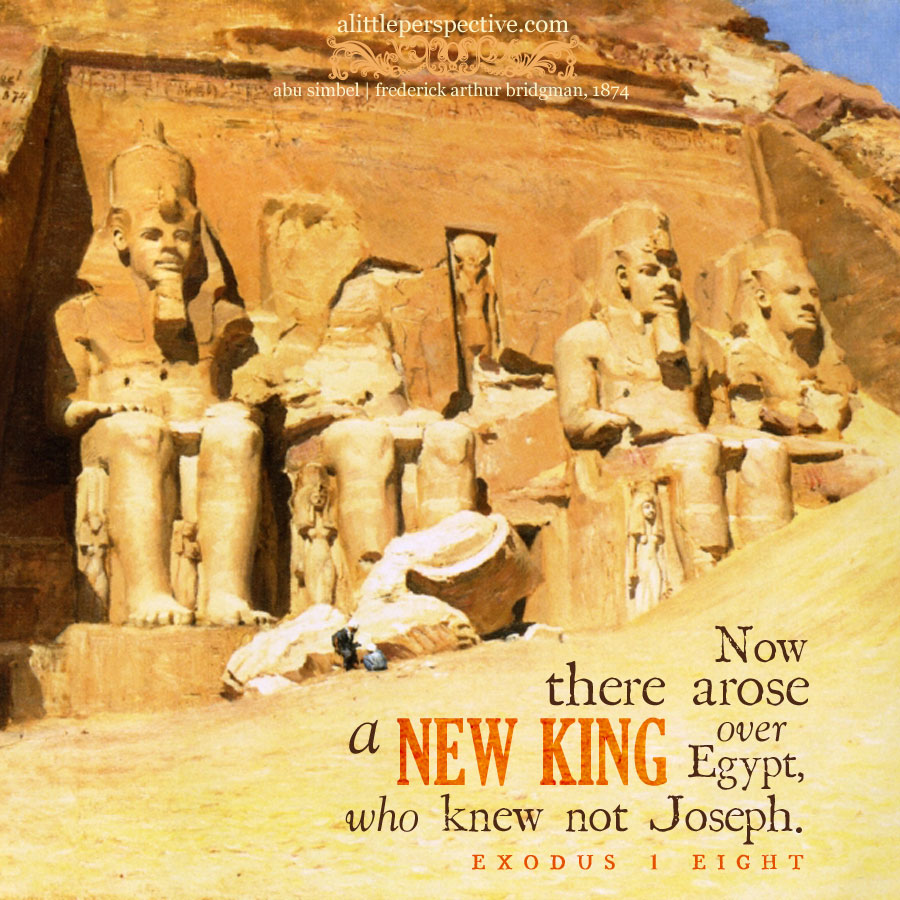Read Exodus 1 at Bible Gateway.
The Hebrew paragraphs for this chapter:
1:1-7 {p} The increase of the children of Israel
1:8-22 {p} The enemy tries to stop their increase
Exodus picks up about 64 years after Joseph’s death at the end of Genesis (four generations: from Levi, Joseph’s brother, down to Moses). The Israelites have by now exploded in numbers in Egypt—from seventy family members to a thriving nation. But a new Pharaoh rises from a new royal family who did not know Joseph (Exo 1:7). Fearing their growth, he enslaves them brutally, forcing hard labor to build supply cities. When that fails to curb them, he orders midwives to kill Hebrew baby boys. God blesses the midwives for defying him, and the people keep multiplying. This oppression sets the stage for Moses and the Exodus, and God’s epic redemption!
Therefore they set over them taskmasters to afflict them with their burdens, and they built for Pharaoh store cities, Pithom and Raamses. Exo 1:11
The name is spelled out clear as day in the Hebrew text: ‘Raamses,’ not a translation error. The Bible names real Egyptian places like Pithom and Raamses, tied to Pharaoh Ramesses II (the Great), who built massive cities, temples, and the capital of Pi-Ramesses in the Nile Delta for military campaigns. Archaeology confirms that these details fit ancient Egypt perfectly. Some scholars claim this proves Exodus was written centuries later by editors (the “Documentary Hypothesis”)—not by Moses, due to conflicts in their Egyptian chronology and the biblical account. Yet the Bible declares Moses as the author of Exodus, and we will see the internal evidence bear this out going forward.
Why This Matters: Moses wrote Exodus by the Holy Spirit’s inspiration, recording events he lived through. There is a reason the first five books of the Bible have been known as The Books of Moses for millennia. He likely compiled Genesis from earlier records passed down from Adam. The Plain Meaning honors God’s Word as true history. Modern reconstruction timelines don’t always match the biblical record, but, what if secular chronology is off? Biblical history, weighted with its own evidence, proves reliable every time.
If there are questions, these are good resources:
The Pharaoh who Knew Not Joseph – Christine Miller
Egyptian Loanwords Confirm Mosaic Authorship – Christine Miller
Ramesses II – Grokipedia
Pharaohs and Kings: A Biblical Quest – David Rohl
The Egyptian Problem – James B. Jordan, Biblical Chronology Newsletter (On Manetho and standard Egyptian chronology)
Searching for Moses – Answers in Genesis
I love AiG, but this particular case is a good example of trying to make the biblical history fit the accepted Egyptian chronology, and I think we need to just admit – the Scripture is true, truth does not contradict, and we can trust the history recorded in the unchanged and unaltered record of Torah.
This documentary explores the archaeological evidence for the biblical history, but they differ with me on the pharaoh of the Exodus. It is worth watching!

















Leave a Reply